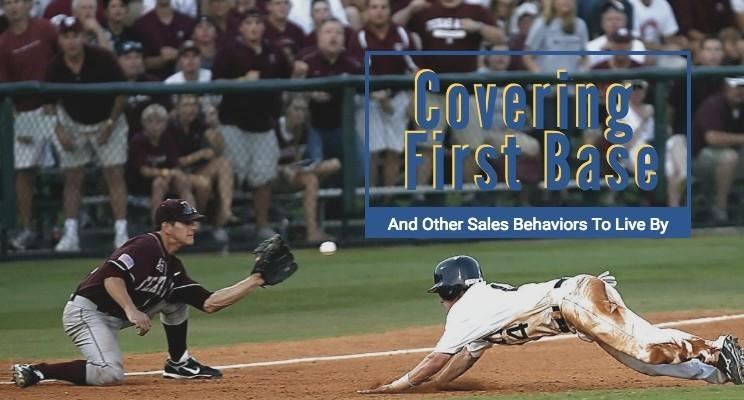If you ever played baseball beyond Little League, you know there are "Cardinal Sins." Things you ALWAYS have to do. Things you NEVER do. All sports, I'm guessing, have them. In baseball, it's things like "Never make the third out at third base" and "Pitchers should never give up a hit on a 0-2 pitch." And one of my favorites - "Never utter the words NO HITTER while the pitcher is throwing a no-hitter." To the unwashed, it sounds silly perhaps. But to baseball guys, these are things you just don't do.
I was chatting with a client not long ago and he shared with me a lesson he learned on the baseball field that he brings into his Senior Executive role in the business world. It really struck a chord with me. He was a pitcher when he was in college. And many of you know what that means...you ALWAYS COVER FIRST BASE on a ball hit to the right side of the field. Not most of the time. Not routinely. ALWAYS. He said, "It tells me all I need to know about a pitcher. If he isn't covering first base, then he's probably not doing a lot of other things either. I know he isn't valuing the little things...so he's probably cutting corners on the big things too. We practice it thousands of times and it has to be automatic - so when they don't do it...well, there's no excuse for it" So true.
It got me thinking about the world of sales. What are the little things? What are those seemingly insignificant behaviors that are markers for how I take care of details? In sales, what's the equivalent of Always Cover First Base?
- Having No Pre-Call Plan. Too many salespeople show up and just "wing it." Hoping to get by with charm and a "leave behind", they don't take a strategic approach to each call. Who are the Cast of Characters? What happened on the last call? What objections am I likely to hear and how will I respond? What do I need to know that I don't already know and how am I going to find out?
- No Post-Call Debrief. When salespeople run from call to call, never reflecting on what they observed and learned, the value of the call is diminished. A good Post-Call Debrief tees up with the questions that should be asked on the next encounter and the Action Items that were committed to. Too many times, we fall victim to good intentions. We plan to debrief at the end of the day or the end of the week. But we never get to it. We never self-evaluate. We put no timelines on Next Steps. We just move on to the next call.
- No goals and plans. Too often, the only goals we have are someone else's. Our quota, our activity benchmarks...things our boss gave us at that beginning of the year meeting. But a great salesperson has their plan, their goals, their activities. And they know on Monday what they need to do to have a great week. They are proactive. For this to be a good week, I need to _________________. And they fill in the blanks with behaviors that they can control. Calls, networking events, unique meetings, customer touches, etc.
- Practicing on Prospects. How much time does the typical salesperson practice? How often do they rehearse their 30-second commercial? How often do they practice the Up-Front Contract or the Budget lead-in? Unfortunately, most salespeople practice only on their prospect. Think about that. Would a football team take off Monday through Saturday and run those new plays in the game on Sunday? Of course not. But salespeople do it all the time.
- Not Having a Process or System for Selling. When I show up and "wing it", I tend to do things a little bit differently every time. The first five minutes of the call look different every time. My flow, my talk track, my questions..."Sometimes I do it this way, and sometimes I do it that way." It's hard to improve if you don't have consistency in your process. It's hard to become a good salesperson when you are "too loose" with your process. Great salespeople have a Way. It may be different than others...but it's theirs. They own it. They tweak it. They improve. They are thoughtful as they go through their steps...and it allows them to laser focus on the prospect.
- No Prospecting Plan. Too many are passive prospectors. It's a nice way of saying they hope someone will call. It's akin to aggressively waiting for the phone to ring. The best have a plan with a mix of activities. They have goals around prospecting calls, the number of referrals they will ask for, the number of networking events or trade shows they'll attend. They are active prospectors...not passive.
I bet you can come up with some Cardinal Rules of your own. These are a few to get you thinking. No salesperson worth their salt would disagree that there are simple habits that we have done hundreds of times...but sometimes, we just don't do them.
How you do anything is how you do everything.

Robin Green
Robin Green is the President and Owner of Ascend Performance, Inc., a certified and award-winning Sandler Training Center in Richmond, VA. He specializes in helping companies of all sizes to develop the Attitudes, Behaviors, and Techniques that will help them reach new levels. Robin is a keynote speaker and podcast host. You can reach him at robin.green@sandler.com. He helps companies and motivated individuals with sales, management, and customer service training.






